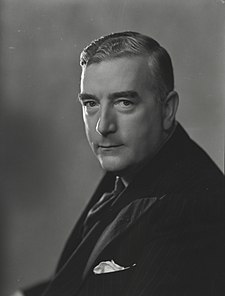Chris Marshall (British Politician)
From Themarshallwiki
| Image |  |
| Current Title | |
| Current Positions: |
|
| Previous Positions: |
|
| Term of Office: | 5 May 2005 |
| Predecessor: | Tony Blair |
| Successor: | Incumbent |
| Birthdate: | 20 December 1960 |
| Place of Birth: | Jeparit, Victoria, Australia |
| Marital Status | Married to Patricia Marshall |
| Profession | Politician |
| Political party | Conservative Party |
| Languages spoken | English French |
| Degrees |
|
Christopher William Marshall (born 20 December 1960) is the fifty second Prime Minister of the United Kingdom of Great Britain and Northern Ireland. He took office on 7 June 2001 after winning the 2001 General Election in a landslide against the Labour government of Tony Blair. Prior to entering Number 10, Marshall had been Leader of the Opposition, Shadow Chancellor of the Exchequer, and Secretary of State for Administrative Affairs.
As Prime Minister, Marshall holds the positions of First Lord of the Treasury and Minister for the Civil Service.
Contents |
Early Life
Marshall was born in Australia, specifically in Jeparit, Victoria. His family were middle-class shopkeepers. He went to Britain for tertiary education and completed a Law degree at Oxford University. While in Oxford, he met a Canadian student, Patricia. In 1986 they married. Marshall funded his studies with a Royal Air Force scholarship. He served in the Oxford University Air Squadron, and as a legal officer in the RAF until 1988. Marshall then moved into private practice. He did well, but wanted to enter politics. He ran for the Surrey seat of Guildford in a 1994 by-election for the Tories and won.
In Government
Marshall spent less than two years on the back bench. In 1996, he was appointed Secretary of State for Administrative Affairs. He spent two years at the DAA, and was able to achieve several important reforms to the civil service. He frequently got the better of his Permanent Under Secretary, Humphrey Appleby. After this brief stint in what some took to be a lower-level department, Marshall was flung into the spotlight as Attorney-General. In this position, Marshall shared with the Home Secretary the duty of keeping innocent Britons safe, and ensuring that the guilty were prosecuted. Marshall believed that this job was right for him, as it was more in keeping with his classical liberal views than the DAA (which Marshall has described as "bureaucracy run amok).
In Opposition
Number 10
While in office, Marshall has achieved the following:
- Liberalisation of gun laws including:
- Legalisation of semi-automatic rifles, and shotguns
- Massive increases in penalties for using a firearm (or airgun or imitation firearm) in the commission of a crime)
- Concealed carry permits in England, Wales, and Scotland
- Firearms licensing changed to a 'shall issue', meaning the Crown must show grounds to deny an application including:
- Severe mental illness
- Conviction of a felony
- Drug use convictions
- Tax reforms as follows
- Income tax rates as follows:
- £0-£6999: 0%
- £7000-£12,999: 3/- per Pound over £7,000
- £13,000- : 4/6 per Pound over £13,000
- Dividend income made the same as other forms of income (i.e. the amounts above refer to all income including wages, salaries, interest, rent (charged), and dividends)
- Company tax reduced to 25% on all profits not reinvested or paid as dividends
- Death tax abolished
- Capital gains tax computed in constant pounds
- Income tax rates as follows:
- Immigration conditions tightened
- Removal of economic protections
- Repeal of the Race Relations Act
- Removal of tax-deductible status for unions that engage in political donations
- Pickets forbidden to block access in any way (i.e. they are required to leave a gap in a picket line which is to be no less than 20 feet wide and which must be adjacent to an entrance/exit of a work site. Any deviation will result in an injunction against the strike, and fines to the union. Pickets may assemble only on public space, and not on the property of an employer unless the union has the employer's consent.
- A new Data Protection Act, with real safeguards, and an active Data Protection Commission.
- The beginning of a program to replace Trident, and the UK's other nuclear weapons
- An extensive upgrade of the SA80 weapon system
- A major rebuild of the CVR(T) series of vehicles
- The strengthening on Habeus Corpus (repealing Blair government legislation undermining it)
- Total ban on unwarranted search, warrants to be signed by a judge (not a clerk)
- Jury trial for all indictable offences
- Abolition (in which the organisation is dissolved, all staff made redundant, all property sold, and all records destroyed) of a series of QUANGOs including
- All self-financing regulating agencies
- The Commission for Racial Equality
- The Equal Opportunities Commission
- Arts Council (and all related bodies)
- All Regional Development Agencies
- Introduction of paid advertising to the BBC, with reductions in the license fee (finally abolished in 2008)
- University grants changed to a government scholarship scheme in which government departments fund certain scholarships in exchange for a term in the Civil Service
- Schooling control returned to Local Education Authorities, Whitehall funding moved to a model in which the amount of funding is determined by the number of students
